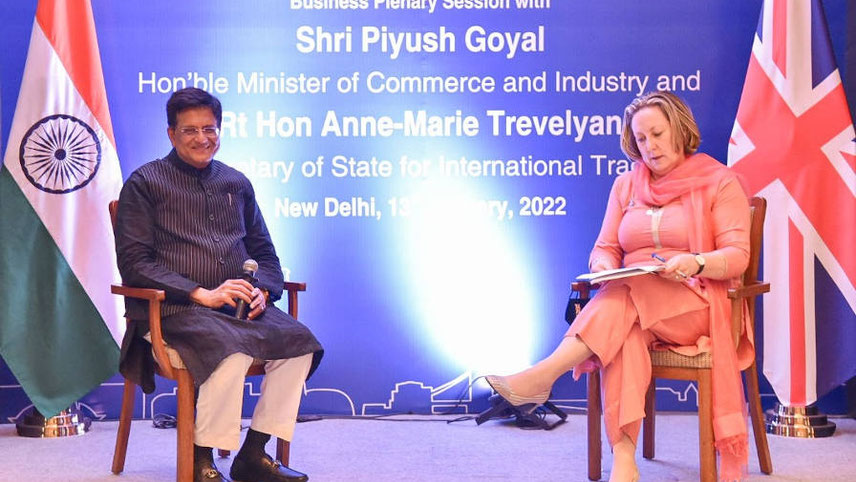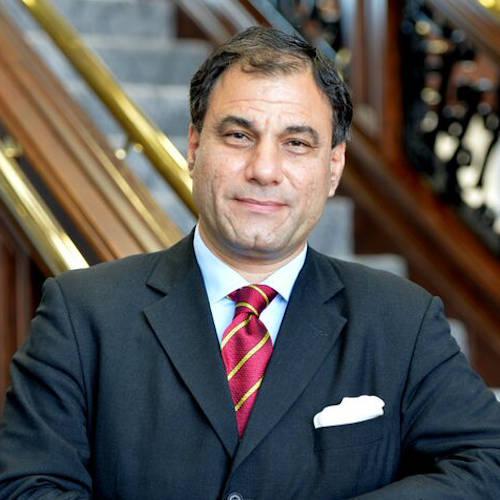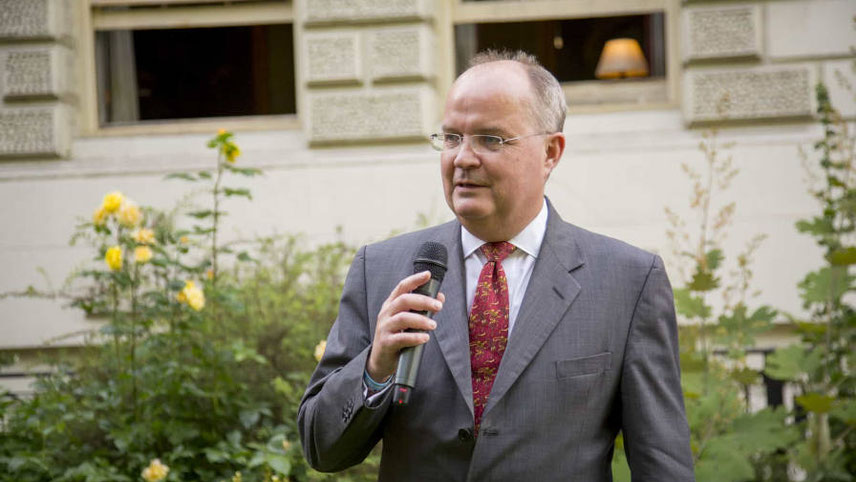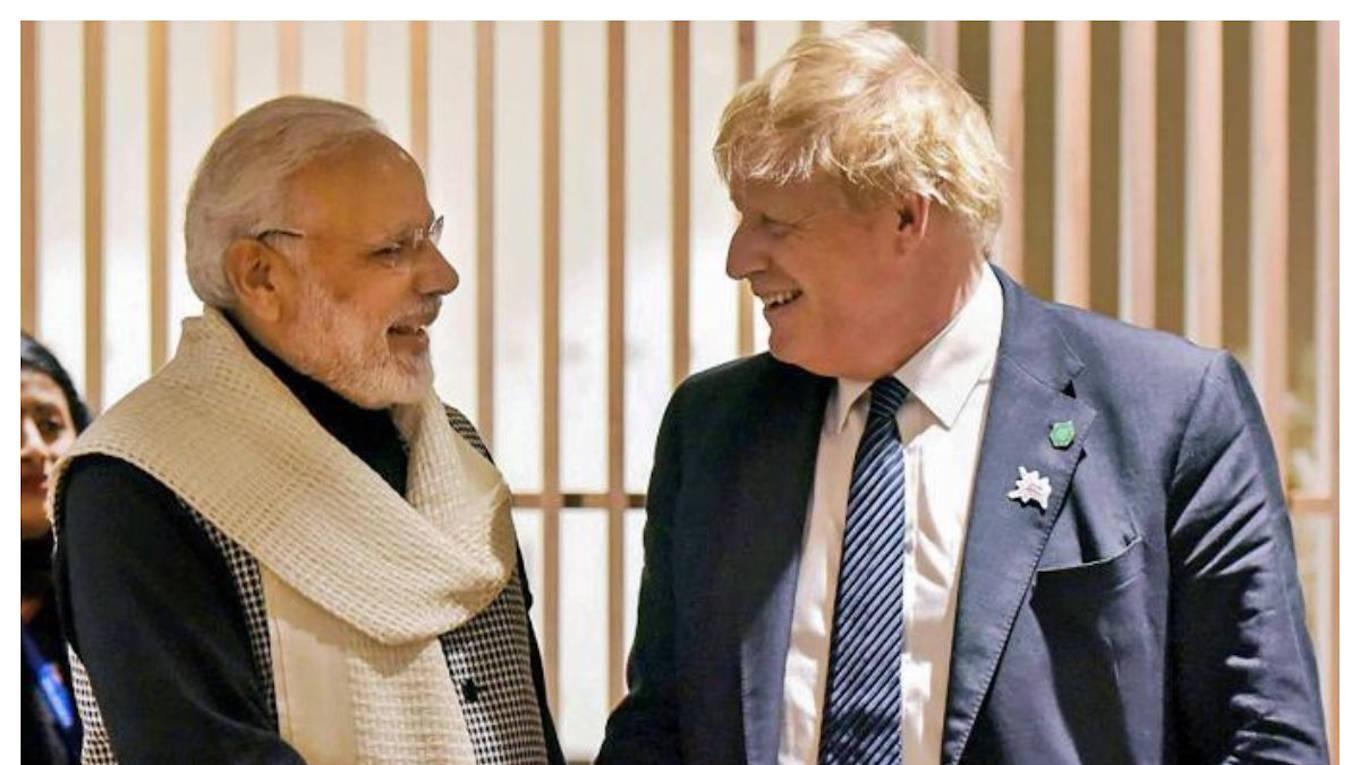-

Goyal with Trevelyan: forging stronger partnerships
India had concluded an early harvest agreement with Thailand in 2004 but has not been able to conclude a comprehensive FTA with the country. India also has a trade agreement with Sri Lanka dealing with goods but was not able to conclude an agreement on services and investments. Hence, much cannot be made out of “early harvest” agreements that do not necessarily graduate into full FTAs and can also face challenges from other countries at the World Trade Organization as WTO rules only permit members to give preferential terms to other countries if they have bilateral agreements that cover “substantially all the trade” between them.
B.V.R. Subrahmanyam, secretary, commerce, is optimistic about the outcome of the negotiations. “I would say in the interim (agreement), we’ll reach about 60-65 per cent of coverage for goods. By the time we reach the final agreement, we will be looking at 90 plus percentage coverage of goods.” The interim agreement would also likely deal with trade in 50-60 services of a total of 160. Subrahmanyam noted that even though the UK imposed small tariffs on most goods, it made a major difference to the competitiveness of a number of Indian products including textiles.
When asked if there were any key issues that India felt were necessary for a trade deal to materialise, Piyush Goyal, commerce minister, said, “Nothing is necessarily a deal-breaker in this agreement.” He added relaxation of visa restrictions, which has been a key issue for India to boost services trade, was not “a pressing or an overriding demand” and that neither side had any demands that were deal-breakers or considered to be “a must” for an agreement. Both countries had agreed to avoid “sensitive issues” and focus on areas where there is more complementarity.
Clearly, the idea is to leave out the contentious parts of the agreement on services. The UK’s demand for letting its lawyers, doctors and accountants open shop in India may also have to take a back seat for now. Recently, Goyal had pitched for opening up of legal services sector, saying it will benefit Indian lawyers “because no lawyer is going to come from America or Europe and practise at Indian rates. But, Indian lawyers will get huge opportunities in Europe and Australia, in America, in all of the world actually, with the kind of skills that our lawyers have.” However, his efforts to get Indian lawyers on board on this issue have not yielded any results so far. The agriculture and dairy sectors are considered sensitive sectors for India in trade talks.
From the UK side, the trade talks are likely also to feature the desire of Britain's financial sector to get into the Indian market, to which it currently exports only one-tenth of its sales to Japan. That would require dismantling of what the UK businesses feel are “complex regulatory barriers” in India. Its lead trade body, CityUK, wants to see fewer restrictions on data flows, and visas for British nationals to work at least temporarily in India. Having seen Cairn Energy and others snared, it is also seeking protection for investments.
-
India marks the start of our ambitious five-star year of UK trade and will show how the deals we negotiate will boost the economies across all nations and help level up all regions of the UK
The early harvest agreement being attempted now is on the lines of a similar pact being attempted with Australia. Pradeep Mehta, Secretary General of CUTS International, says the government’s emphasis on interim agreements may be tactical so that a deal may be achieved with minimum commitments and would allow for contentious issues to be resolved later.
Some fear that the early harvest pact may end up being a (Scotch) whisky-for-visas arrangement. India is the world's biggest market for whisky, most of it termed “Indian-made foreign liquor.” Domestic distillers have lobbied fiercely and successfully to limit Scotch imports. According to industry sources, a bottle sold in Mumbai or elsewhere in Maharashtra used to carry a further 300 per cent import tariff, though that was recently halved to 150. Though Scotch makes up only 2 per cent of India's market, the value of Scotch whisky sales to India has risen from below £60 million in 2011 to more than £150 million in 2019.
By volume, last year saw India become the third biggest market for Scotch. But as 60 per cent of that is in bulk, for bottling in India or for blending with local spirits, that is lower value Scotch than exported to other markets. Scotch Whisky Association calculates that if the import tariffs come down to around 25 per cent, there will be £1.2 billion more exports within five years. That could generate 1,300 jobs in the UK.
But it may not be that smooth going. The Confederation of Indian Alcoholic Beverage Companies (CIABC) has urged the government for a level playing field with British players. The CIABC has written to the commerce ministry requesting it for a staggered reduction in effective customs duty on spirits and wines from the current 150 per cent under the proposed FTA. Besides, it requested the Centre to bring in measures which would prevent dumping or predatory price exports to India. Also, the beverage producers must be given equal opportunities for exports from India – particularly to the UK. India should also allow selling Indian whiskies in the UK as “Indian Whisky’, irrespective of whether they were made from malt, grain spirits or molasses-based spirits.
On the flip side of the coin, India expects a trade deal with the UK could boost exports for large job creating sectors such as textiles, leather goods, and footwear. As an immediate outcome, it is seeking greater opportunities for Indians to live and work in Britain, and any trade deal could be contingent on relaxing rules and lowering fees for Indian students and professionals going to Britain. There have been unconfirmed reports that the UK is planning to relax immigration rules by offering cheaper and easier visas for Indian tourists, students and professionals, in an attempt to clinch the trade deal.
In May last year, S. Jaishankar and Priti Patel, UK’s secretary for home, signed a ‘bespoke’ and reciprocal Migration and Mobility Partnership (MMP) to have around 3,000 students and professionals a year access work experience benefits in either country. Under the MMP, both sides have agreed to work towards an April 2022 timeline to bring the new system in place, with work underway in the High Commission in London and the Ministry of External Affairs in New Delhi.
-

Bilimoria: a new era of partnership
However, under further immigration plans reportedly in the works, one option being looked at is a scheme similar to that agreed as part of the UK’s FTA with Australia, which would allow young Indians the chance to come and work in the UK for up to three years. Another option would be to cut visa fees for students, thereby allowing them to stay in the UK for a period after they graduate, possibly building upon the Graduate Route visa under the points-based immigration rules currently in place.
There could also be reductions in the fees for work and tourism visas. At present, it can cost an Indian citizen up to £1,400 for a work visa, while students pay £348 and tourists £95 respectively. These are in sharp contrast with visa fees for countries such as China, who have to pay significantly less.
According to reports in the UK media, there is an acceptance by UK ministers that the price of a trade deal with India would be to make a “generous” offer on visas. “The tech and digital space in India are still hugely protectionist and if we could open up even a slither of access, it would put us ahead in the game,” a government official was quoted as saying.
Karan Bilimoria, president of the Confederation of British Industry, has been among the most vocal advocates for lowering visa fees for Indians. But he feels a larger FTA would suit the interests of both countries. “That FTA, I hope, will benefit in enhancing bilateral trade and be as comprehensive as possible. Movement of people; reduction of duties and tariffs – the tariff on Scotch whisky is 150 per cent, that’s got to be reduced drastically; academic collaborations and cross-border research is going to be huge between our countries and partnering on a Green industrial revolution. There is a vast array to really ramp up business and trade between our two countries,” he said.
A larger India-UK FTA is being billed in the UK as creating huge benefits for both countries, with the potential to boost bilateral trade by up to £28 billion a year by 2035 and increase wages by up to £3 billion across the UK. A deal with India is also pegged as a "big step forward" in the UK's post-Brexit strategy to refocus trade on the Indo-Pacific, home to half of the world's population and 50 per cent of global economic growth.
The Department for International Trade (DIT) has said the UK wants an agreement that slashes barriers to doing business and trading with India's growing economy and market of 1.4 billion consumers, including cutting tariffs on exports of British-made cars and, of course, Scotch whisky. According to DIT estimates, removing duties alone would increase UK exports to India by up to £6.8 billion, with Scotch whisky and cars currently facing enormous duties of 150 per cent and 125 per cent respectively.
-
A larger India-UK FTA is being billed in the UK as creating huge benefits for both countries, with the potential to boost bilateral trade by up to £28 billion a year by 2035 and increase wages by up to £3 billion across the UK
As Richard Heald, executive chair, UK-India Business Council, points out, “The events of 2020 and early 2021, including BREXIT and Covid-19, have thrown up undoubted hurdles causing us all to think 'outside the box' in our working processes and practices. But they are also causing us to identify new opportunities for re-invigorated collaborations and streamlined supply chains.”
Notwithstanding the current Covid-related events, he says, there is a real opportunity to look forward and to catalyse new ways of strengthening the UK's bilateral economic relations with our major partners around the world. India is front and foremost on this list of the UK. Hence a renewed focus on the attainment of a comprehensive FTA for which so many building blocks already in place.
Back in May, India and the UK clinched an Enhanced Trade Partnership during a virtual summit between Prime Ministers Modi and Johnson, with the goal to double bilateral trade to £50 billion by 2030. The UK government points out that the Enhanced Trade Partnership already creates immediate opportunities for British businesses in India across industries, such as food and drink and life sciences.
Following this, the UK government launched a 14-week consultation to seek the views of the public and business before formal negotiations. Unlike India, it is mandatory in the UK must complete a pre-negotiation scoping phase – a period of engagement with businesses and the public. The consultation, which ran till 31 August, included a questionnaire that gathered information from participants about their experiences and priorities when doing business with India.
The UKIBC's Doing Business in India latest report finds that the most frequently selected obstacle to doing business in India, as per UK businesses, is 'legal and regulatory barriers' like 'foreign exchange regulations', 'goods and services tax', 'import tariffs', 'alignment with international standards' and 'incorporation of company'.
The FTA is seen as the next step in the bilateral engagement, with an interim agreement coming ahead of a full-fledged deal. The UK is pitching the India FTA as a major move since its exit from the European Union (EU), in support of free and fair trade in the Indo-Pacific. The launch of similar negotiations with Canada, Mexico and the Gulf are in the pipeline, besides membership of the £8.4 trillion Comprehensive and Progressive Agreement for Trans-Pacific Partnership trade bloc.
“A trade deal with India's booming economy offers huge benefits for British businesses, workers and consumers. As we take our historic partnership with India to the next level, the UK's independent trade policy is creating jobs, increasing wages and driving innovation across the country,” Johnson said. “The UK has world-class businesses and expertise we can rightly be proud of, from Scotch whisky distillers to financial services and cutting-edge renewable technology. We are seizing the opportunities offered in growing economies of the Indo-Pacific to cement our place on the global stage and deliver jobs and growth at home.”
Trevelyan who had met Goyal in New Delhi for the 15th UK-India Joint Economic and Trade Committee (JETCO) to review the progress within the UK-India Enhanced Trade Partnership said, “By 2050, India will be the world's third-largest economy with a middle class of almost 250 million shoppers. We want to unlock this huge new market for our great British producers and manufacturers across numerous industries from food and drinks to services and automotive.”
-

Heald: time to think out of the box
“As an independent, deal-making nation, the UK is broadening our economic horizons and forging stronger partnerships with the fastest-growing economies of the world. India marks the start of our ambitious five-star year of UK trade and will show how the deals we negotiate will boost the economies across all nations and help level up all regions of the UK,” said the UK minister who also held bilateral talks with external affairs minister S. Jaishankar, among others.
The UK’s business community has welcomed the development. “We are delighted to see FTA negotiations launch between the UK and India. With India, a rapidly advancing global economic superpower, this trade deal can unlock a new era of partnership and pave the way for significant trade and investment opportunities for UK and Indian businesses,” said Lord Karan Bilimoria.
“To fully realise the growth possibilities, the UK must focus on the areas which will drive our future economic success, such as collaborative innovation and stronger regulatory alignment. Above all, trade is a key instrument for economic growth and prosperity across all regions and nations.”
“Key to any future trading relationship will be the progressive removal of tariffs, enhanced trade facilitation and reducing other barriers to trade, which can be highly complex and burdensome,” said Mike Hawes, chief executive of the UK's Society of Motor Manufacturers and Traders.
DIT analysis claims a trade agreement with India would benefit all parts of the United Kingdom, given that already around 30,000 people in the West Midlands were employed via Indian investment in 2019. The northern region of England could see a massive boost of up to £300 million with opportunities for manufacturers of motor vehicles and parts.
The Modi government's plans to install 175 GW of renewable energy capacity by 2022 are also seen as a major opportunity for the UK's renewables industry, which hopes to benefit from a deal that slashes barriers such as import tariffs as high as 15 per cent on wind turbine parts.
But before that happens, both sides will have to settle for a please-all, early harvest agreement. The agreement may appear incomplete and truncated but it will be a beginning.





































